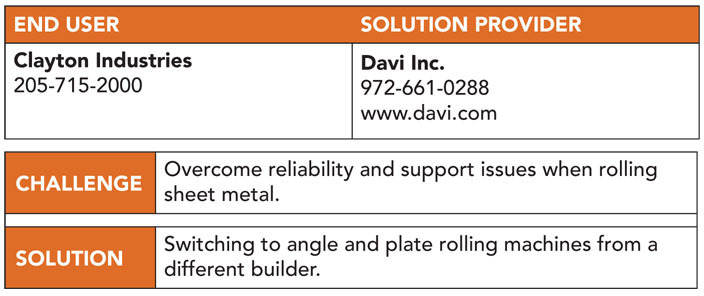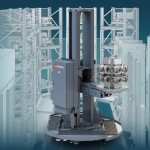Shop Is Big On Advanced Metal Forming
Shop Is Big On Advanced Metal Forming
Clayton Industries chose an MCP three-roll, double-pinch angle rolling machine from Davi Inc. for its processing speed, accuracy and versatility.

At Clayton Industries, bigger is better when it comes to the parts it produces. The 43-person industrial metal fabrication and machine shop considers rolled components made from sheet material under 1,828.8 mm (6') wide and 25.4 mm (1") thick as small. That's because the Birmingham, Alabama, shop specializes in cold-rolling plates up to 4,267.2 mm (14') wide and 152.4 mm (6") thick.
The shop's workpiece materials include steel, stainless steel and aluminum. With aluminum, the shop can roll larger widths, but in essence, material types are all the same to the shop in terms of its rolling capabilities.

With Clayton's angle rolling, plate rolling, press braking, machining and plasma/oxy fuel cutting capabilities, it handles an expansive range of jobs with speed and consistency.
For angle rolling, Clayton chose an MCP three-roll, double-pinch angle rolling machine from Addison, Texas-based Davi Inc. for its processing speed, accuracy and versatility. The machine is a vertical shaft configuration that handles Clayton's large, heavy jobs that can include 1,016 mm-tall (40") I-beams, 203.2 mm-dia. (8") pipe, 254 mm × 254 mm (10" × 10") angle material and more.
The MCP machine features two side rolls moving against a fixed roll. The side rolls, which are actuated by planetary guides, provide the necessary bending force for achieving tight diameters per capacity.
These machine capabilities allow Clayton to generate such parts as support ribs 177.8 mm long × 101.6 mm wide × 88.9 mm thick (7" × 4" × 3.5") that run along the inside of a ship's hull for strengthening. Those are unique in that they are single pieces of galvanized steel with non-continuous radii along their lengths. Normally, the part would require multiple pieces spliced and welded together.
Clayton also relies on Davi for plate rolling machines that provide the shop with high repeatability, productivity and ease of use. The four-roll style machines incorporate the latest, most advanced rolling technology. Their bottom rolls clamp plate material to guarantee control over plate position throughout the entire forming process.
"What's challenging about rolling any part, on any machine, is keeping it square and true," said Neal Clayton, vice president at Clayton Industries. "That ensures that when the two ends join, they are perfectly parallel and the edges line up precisely. The Davi machine makes it easier to do because of its advanced design."
Special Davi planetary guides actuate the machine side rolls, which then deliver the necessary bending force Clayton needs for achieving its perfectly matched cylinder and cone-shaped part ends. Davi's Servo- Tronic system ensures parallelism for high machine accuracy, while advanced CNCs provide fully automated production processes. A key component Clayton makes using its Davi plate rolling machine are steel pylons/pillars that are submerged below ocean surfaces and filled with sand. These pillars form break walls to prevent erosion.
What Clayton said he likes about the Davi plate rolling machine is that it allows the shop to also plate roll coned parts with variable geometries — major diameter and a minor diameter — using the machine's tilting top roll. Previously, such parts had to be formed, which isn't that efficient, according to Clayton. The Davi machine allows them to achieve in minutes what used to take a full day — producing coned parts the shop provides to customers like NASA and a major nuclear reactor repair company.
After being unsatisfied with both the reliability and support of another brand of rolling machines, Clayton said the shop turned to Davi because of its higher quality and exceptional service and support. "With one of our other brands of plate rolling machines, we have to make repairs on a quarterly basis, while the Davi machines just keep running without any issues."
At Clayton, a down machine means lost capacity, and if the shop misses a job delivery time, its reputation suffers and runs the risk of losing business. To make sure that it never happens with the Davi machines, Davi goes above and beyond in terms of service, support and maintenance, according to Clayton.
"For us, it comes down to customer service and maintenance," he said. "We can get the machines to do whatever we want them to, but Davi was the one supplier that really wanted to partner with us, providing exactly what we needed, which is how we approach business with our customers. We stand behind every job we do, and we want equipment suppliers with those same values."

Trucks arrive at Clayton daily for shipping completed parts, and on a monthly basis, about 100 trucks worth of output ships from the shop. The Davi machines, according to Clayton, provide the capability to produce parts that are impossible to do any other way, such as those that require variable geometries and radii.
"There is no other machine on the market that gives us the rolling and bending precision and dependability we get with our Davi machines," Clayton said. "Our customers are very demanding because they know what they want, when they want it and exactly how much it should cost, and our job is to fulfill all those needs."
Clayton's grandfather started the shop in 1963 to provide parts for steel mills, and the shop has grown based on customer need. The shop actually started as a full-service machine shop, then due to customer demand expanded into fabrication.
"Going forward, we see our relationship with Davi expanding," said Clayton. "As customer demand increases and our production continues to grow, we will look to Davi for the equipment that will allow us to grow our capacity, keep pace with demand and produce tomorrow's parts."





